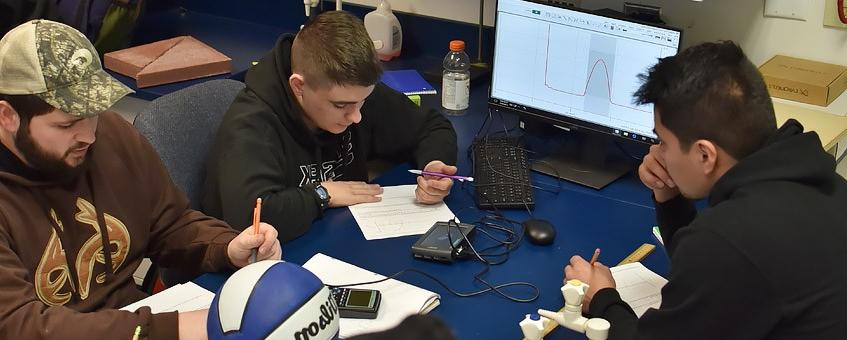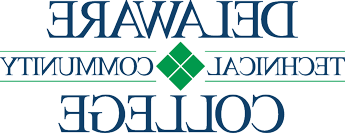
Science Education: Chemistry/Physics
Associate Degree Program
Delaware has been experiencing teacher shortages in specific critical areas for over a decade. The STEM (Science, Technology, Engineering, and Mathematics) initiative recognizes the need for highly-qualified teachers in these areas, and the Department of Education consistently lists all science disciplines as a critical need for Delaware schools.
The Science Education Associate Degree prepares students for transfer to a baccalaureate degree program that leads to a teaching career in high school physics or chemistry. The program provides rigorous science course work as well as field experience in a secondary school setting.
Offered at the following campus(es): Dover, Georgetown, Stanton
What You Can Do
In this program, you will gain the knowledge and skills to prepare you for positions such as:
- Upon completion of your associate degree, you can work as a paraeducator in the school system.
- Upon completion of your bachelor’s degree, you can work as a high school chemistry or physics teacher.
What You Will Learn
Program Graduate Competencies
The Program Graduate Competencies listed below identify the major learning goals related to your specific program of study and identify the knowledge and skills you will have when you graduate to be successful in your chosen field.
- Employ mathematical problem solving strategies to solve algebra, trigonometry, analytical geometry and calculus problems.
- Apply scientific principles to explain everyday phenomena.
- Analyze problems, safely and ethically conduct scientific research, and interpret and report the results.
- Integrate psychological and human development concepts in the educational process.
- Demonstrate and explain the scientific process and related modern laboratory procedures.
Core Curriculum Competencies
The Core Curriculum Competencies listed below identify what you will be able to do as a graduate, regardless of your program of study. You will acquire these core competencies through general education courses and program-specific coursework. You will be expected to use relevant technology to achieve these outcomes:
- Apply clear and effective communication skills.
- Use critical thinking to solve problems.
- Collaborate to achieve a common goal.
- Demonstrate professional and ethical conduct.
- Use information literacy for effective vocational and/or academic research.
- Apply quantitative reasoning and/or scientific inquiry to solve practical problems.
Suggested Pathway to Graduation
Semester 1
| Number | Course Title | Credits |
|---|---|---|
| SSC 100 | First Year Seminar | 1 |
| MAT 183 | Reasoning with Functions I | 5 |
Semester 2
| Number | Course Title | Credits |
|---|---|---|
| ENG 101 | Composition I | 3 |
| PSY 121 | General Psychology | 3 |
| MAT 193 | Reasoning with Functions II | 4 |
| CHM 110 | General Chemistry | 4 |
Semester 3
| Number | Course Title | Credits |
|---|---|---|
| ENG 102 | Composition II | 3 |
| PHY 205 | General Physics I | 4 |
| Or | ||
| PHY 281 | Physics I with Calculus | 4 |
| MAT 281 | Calculus I | 4 |
| CHM 150 | Chemical Principles I | 5 |
Semester 4
| Number | Course Title | Credits |
|---|---|---|
| MAT 282 | Calculus II | 4 |
Semester 5
| Number | Course Title | Credits |
|---|---|---|
| MAT 283 | Calculus III | 4 |
| Or | ||
| BIO 150 | Biology I | 4 |
| CHM 151 | Chemical Principles II | 5 |
| PHY 206 | General Physics II | 4 |
| Or | ||
| PHY 282 | Physics II with Calculus | 4 |
| PSY 127 | Human Development | 3 |
Semester 6
| Number | Course Title | Credits |
|---|---|---|
| Or | ||
| MAT 288 | Linear Algebra | 4 |
| Or | ||
| PHY 284 | Oscillation and Waves | 4 |
| Or | ||
| CHM 240 | Organic Chemistry I | 4 |
| SPA 136 | Spanish Communication I | 4 |
| Elective | Social Science Elective | 3 |
| EDC 260 | Educational Psychology | 3 |
| HIS 111 | U. S. History: Pre-Civil War | 3 |
| Or | ||
| HIS 112 | United States History Post-Civil War | 3 |
Approved Electives
Select one (1) social science elective.
| Number | Course Title | Credits |
|---|---|---|
| ECO 111 | Macroeconomics | 3 |
| ECO 122 | Microeconomics | 3 |
| SOC 111 | Sociology | 3 |
| ENG 124 | Oral Communications | 3 |
To complete program requirements, you must pass the above courses and earn at least 73 credits. The number of courses and credits required for graduation may be more depending on college readiness and the elective courses offered in your program major (if electives are a part of the program).
EDCAATSPC
Pursuing a Bachelor's Degree?
This is a Connected Degree program that enables you to complete your associate degree and then transfer to a four-year degree program as a junior. See a program advisor for details!
This program is offered at the Dover, Georgetown and Stanton campuses.

